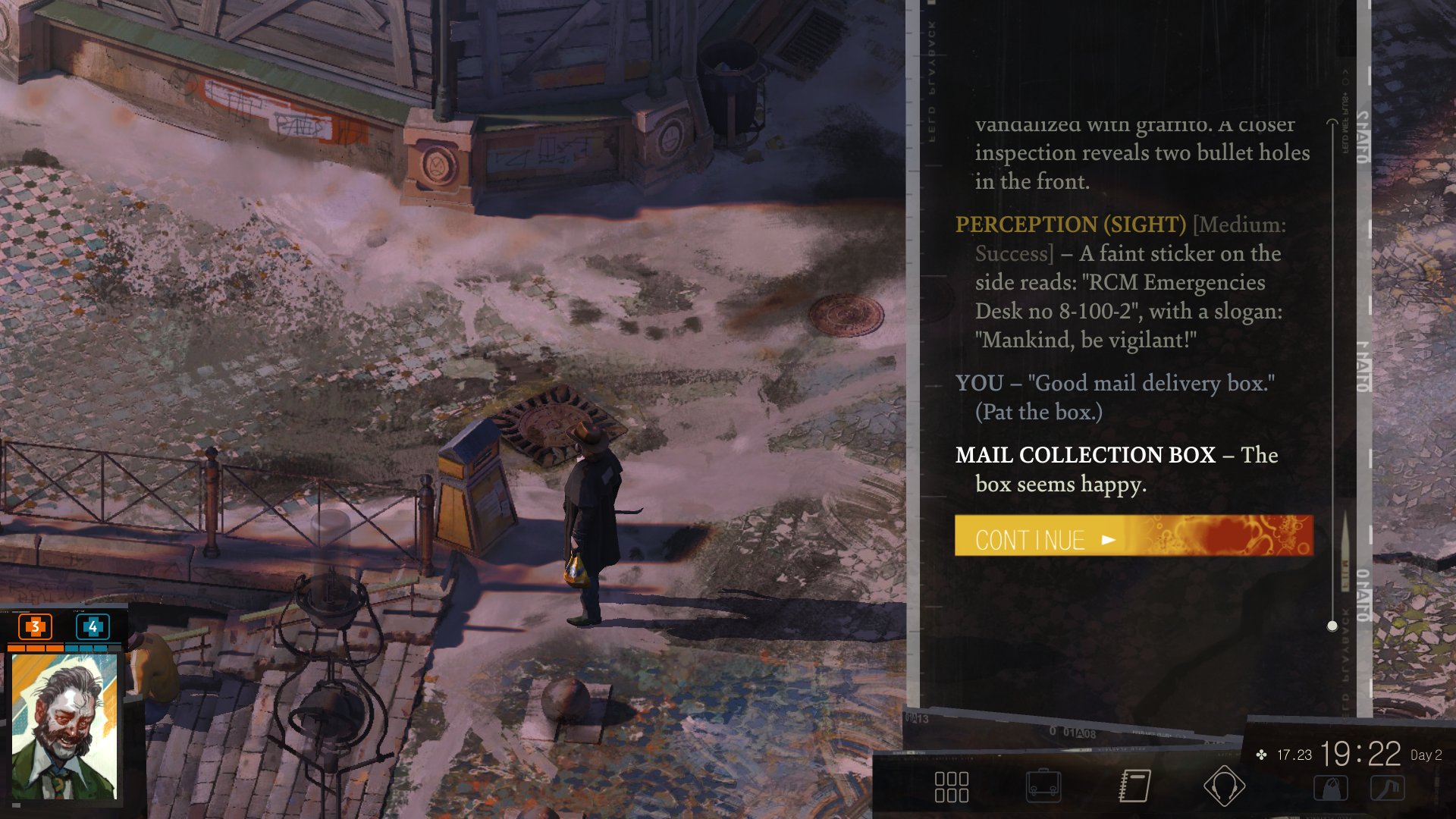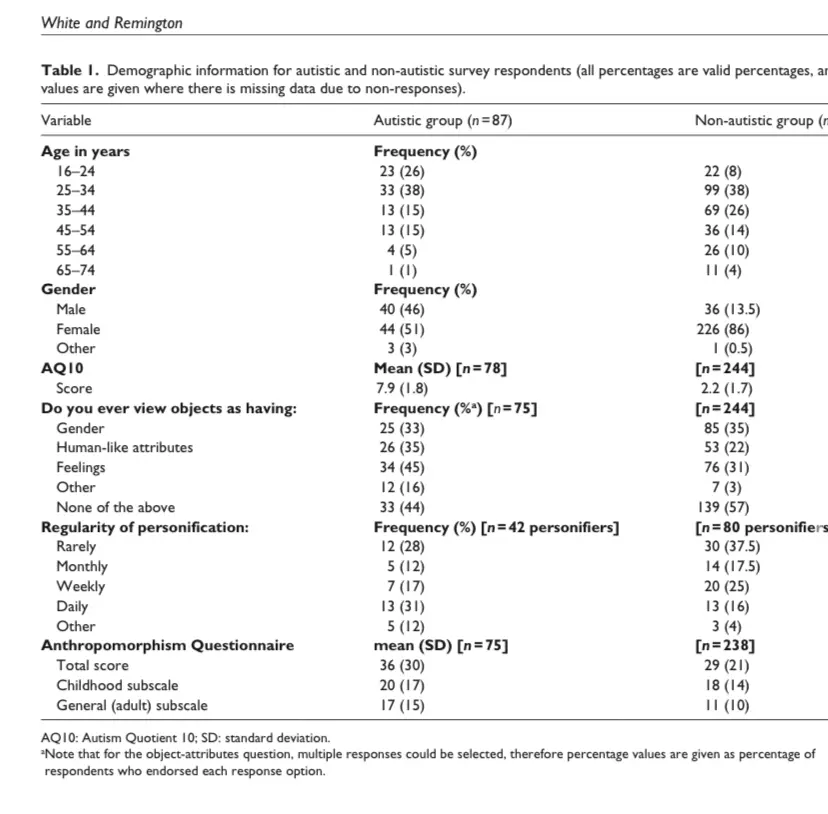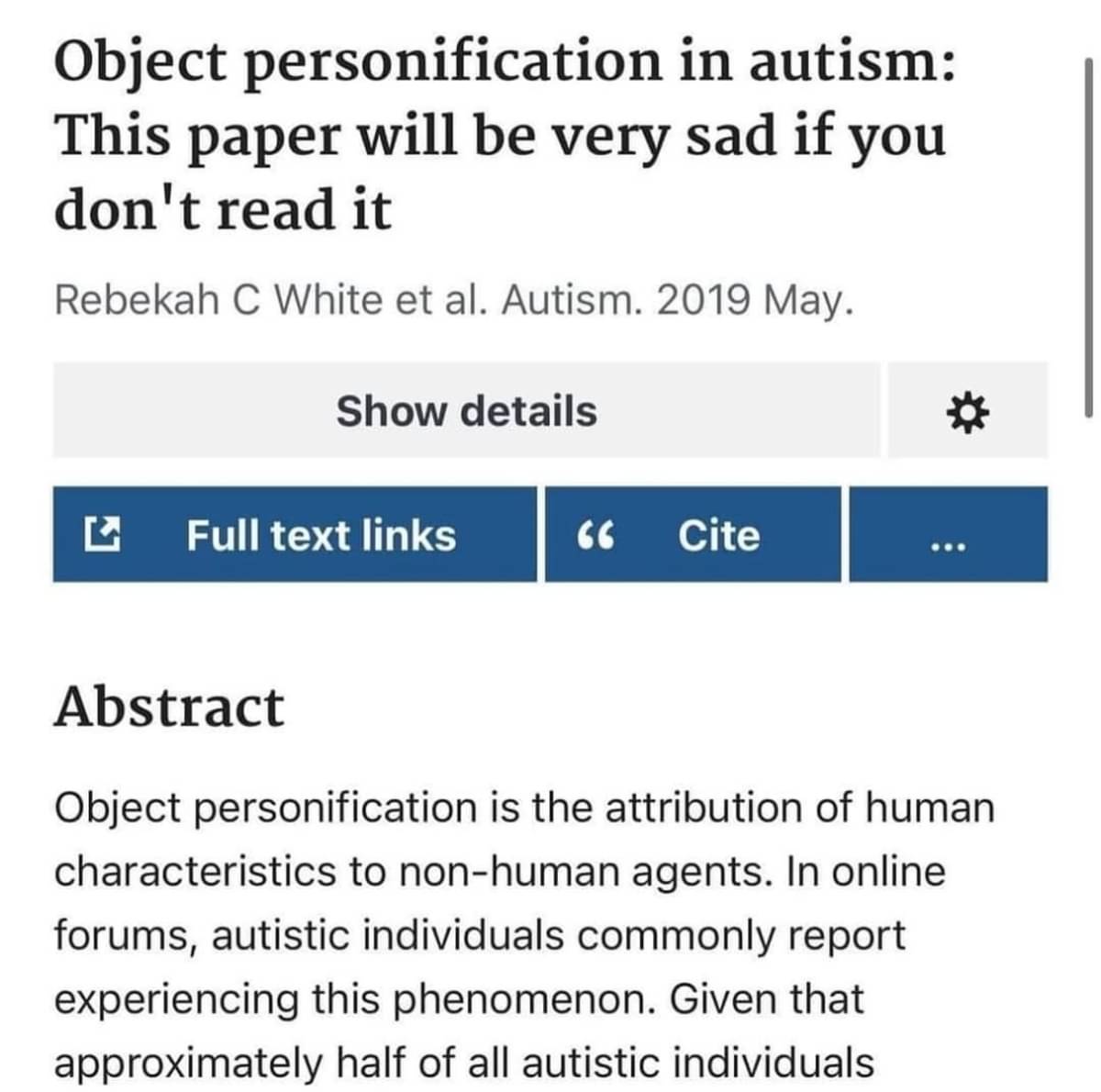Clickbait for autistic people
I had to grit my teeth to restrain myself from looking this up
Anyone got a link to the paper? I kinda want to read it
thanks, the paper won't be sad anymore!
I object.
Well now I've gone and personified you. Hallo, object!
I object.
I hear sci hub is a pretty cool website that lets you find a paper by its doi number
Wait, other people don't do that? Well, that explains a lot... Since I was a kid, I never understood how people treated their stuff so badly and throw stuff away without a second thought. I take care of my stuff for as long as I can, and almost never throw anything away. They're like companions who walk with me in my life, and I'm never giving up on an old friend.
I'm not autistic and I feel the same way. It makes me sad to throw something away if it's still got some use in it.
I don't think that's exactly the same situation though. Your comment reads as utilitarian, is that your reasoning for it? The object personification lends to an association of empathy for the object itself. Meaning that maybe the object is a human too and acts as we do
I apologize to my things when I accidentally bang them against something.
Sometimes objects im using have like, a personality and desire? Like they won't want to get thrown out or there's some kind of relationship between two forks.
Its kind of subconscious - I'm only somewhat aware of it. Its weird.
Also when in recalling things Ive learned recently I'll sometimes recall a place I've been to as well. This happens most frequently with code for some reason. Programs I've written or functions will be strongly tied to places in some way? I don't get it.
This comment will be very sad if you don't interact with it
Downvoting so comment is happy
The comment has a degradation kink.
I'm confused, but happy.
Goddammit you got me
When I was a kid, every letter and number seemed to have a gender to me.
- Male: a, c, d, e, g, h, j, l, m, n, o, p, x, z, 1, 2, 4, 5, 6, 9
- Female: b, f, i, k, q, r, s, t, u, v, w, y, 3, 7, 8
- NB: 0
T is male. M is female and dating Mr. N.
T is a strong, amazonian woman. t is a tomboy skater who likes competitive street boxing.
back in the olden times, straight lines were masculine and curved lines were feminine.

You must now boot up Disco Elysium and go tell the mailbox that everything will be ok.
As a child I would hide newspapers under the couch so my mommy wouldn't use them in the fireplace.
Oh no the poor newspapers
My dad had to mow the lawn when I was away or heavily distracted because I'd cry about the dandelions and daisies being cut down lol
Still irks me to this day when I have to do it.
It's the opposite for me. As a child, I had an irrational fear of dandelions. When my dad had to mown the lawn, I cheered from the window, as I could finally go outside again.
Given the climate collapse I figure we'll both lead lives that will eventually lead us to Highlander-Dueling it out over the last dandelion and what to do with it
lemme guess, this paper is probably pay walled also?
God i love modern science, it's so much fun.
Yes.
Don’t anthropomorphize computers, they hate that.
I hope i don't make the paper sad by saying this but the numbers are kinda off. (Or i misunderstand)
The only real difference is for below age 24. Then its pretty much the same if not less prevalent for autists.
They point to some other factors about the types of questions that indicate that the differences are underestimated but evidently that didn’t translate in hard numbers.

I think you are misreading this. The age sections at the top are just a demographic breakdown of the two groups. Note rhat all the different percentages for age sum to 100. The results are just the bottom section of your screenshot ("anthromorphic questionnaire"). Does seem to be statistically significant.
The actual results are in the text. 56% personifiers among autists vs 33% among not autists, p<0.05. Self report is p=0.06.
I'm pretty sure the age and gender in that table is just showing the frequency of the ages in the sample, not a crosstab of age or gender with personification/anthropomorphism.
So that's saying their autistic population skewed younger than their non-autistic population. Which isn't unsurprising, it's a lot easier to get a diagnosis as a child, and generally easier to get diagnosed now compared to a few decades ago. So people over 35 or so are going to just be less likely to have had the opportunity for diagnosis. The authors do address differences in gender representation between the samples but I don't see age addressed specifically. It could just be that younger people tend to personify/anthropomorphize more, so since the sample of people with autism skewed pretty heavily towards the 16-24 group the results could instead be displaying differences by age. I don't think they quite have the sample size to delve into age too much. I think they'd only be able to get away with doing two groups at 34 & under and 35+. That would be a good start though.
This is also a heavily self-selected population, apparently largely from social media. I'm always automatically skeptical of social media sampling.
I would've liked to see a little more detail about exactly which tests and assumptions they were using. The gender difference looks like they did a t-test, but it's left to the reader to assume they ran a two-tailed t-test. They could easily have bolstered their numbers by reporting the one-tailed test.
Mother fucker....
I personified numbers all the time, 8 and 9 were based off of Smithers and Burns, 4 and 7 were female 4 was more the girl next door, and 7 was more the "Good bad girl"
I genuinely got separation anxiety after taking my last CRT to the tip.
I misread autism as one of the coauthors, so

TIL that Japanese people are all autistic.
edit: an explainer as I can see how this sounds insensitive without context (note that I am not Japanese, this is only from what I have come to understand as an outsider looking in)
Japanese folklore, as Shinto, puts forth the idea that inanimate objects can have (or develop?) their own (personified) spirits. This has carried over to modern behaviour and beliefs, where personification of objects is quite common.
Even if most Japanese don't identify as being of Shinto faith/spirituality, and probably don't believe that random inanimate object X has a living spirit within it, items are often treated with great care as though they were to have a spirit. (theory time: maybe this plays a part in why you can often find used items in such good condition in Japan...)
That title is amazing
Gotta say this is one ASD trait that I very much don't have and is kind of hard to relate to.
Can someone explain like I'm 5?
A lot of people with autism feel bad when you hurt an objects feelings, which contradicts the traditional "autism is when no empathy" narrative.
Scientific papers are often titled "What it's actually about: something witty." This one is about object personification and so after the colon they personify the paper itself by giving it an emotion.
Science Memes
Welcome to c/science_memes @ Mander.xyz!
A place for majestic STEMLORD peacocking, as well as memes about the realities of working in a lab.

Rules
- Don't throw mud. Behave like an intellectual and remember the human.
- Keep it rooted (on topic).
- No spam.
- Infographics welcome, get schooled.
This is a science community. We use the Dawkins definition of meme.
Research Committee
Other Mander Communities
Science and Research
Biology and Life Sciences
- [email protected]
- [email protected]
- [email protected]
- [email protected]
- [email protected]
- [email protected]
- [email protected]
- [email protected]
- [email protected]
- [email protected]
- [email protected]
- [email protected]
- [email protected]
- [email protected]
- [email protected]
- [email protected]
- [email protected]
- [email protected]
- [email protected]
- [email protected]
- [email protected]
- [email protected]
- [email protected]
- [email protected]
- !reptiles and [email protected]
Physical Sciences
- [email protected]
- [email protected]
- [email protected]
- [email protected]
- [email protected]
- [email protected]
- [email protected]
- [email protected]
- [email protected]
Humanities and Social Sciences
Practical and Applied Sciences
- !exercise-and [email protected]
- [email protected]
- !self [email protected]
- [email protected]
- [email protected]
- [email protected]
